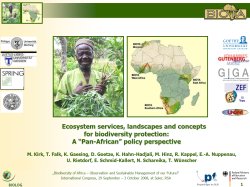|
|
|
 |
|
|
Presentation
< back to presentation overview
| Details of the presentation |
| Presentation |
Oral presentation |
| Title |
Ecosystem services, landscapes and concepts for biodiversity protection: A “Pan-African” policy perspective
|
| PDF Download |
 Download PDF (Filesize 1.4 MB)
Download PDF (Filesize 1.4 MB)

|
| Short title |
African Policy Perspectives for Biodiversity Protection
|
| Author(s) |
Falk, T.(1); Gaesing, K.(2); Goetze, D.(3); Hahn-Hadjali, K.(4); Kirk, M.(1); Nuppenau, E.-A.(5); Rietdorf, U.(6); Schareika, N.(7); Schmid-Kallert, E.(2); Wünscher, T.(8)
|
| Presenting author |
Kirk, M. (1)
|
| Institution(s) |
(1) Institute of Co-operation in Developing Countries, University of Marburg; (2) Faculty of Spatial Planning of Developing Countries, University of Dortmund; (3) Institute for Ecology Evolution and Diversity, University of Frankfurt a.M.; (4) Institute for Biosciences, Department of Botany, University of Rostock; (5) Institute of Agricultural Policy and Market Research, University of Giessen; (6) GIGA, Hamburg; (7) Institute for Ethnology and African Studies, University of Mainz; (8) Centre for Development Research (ZEF), University of Bonn
|
| Keywords |
Ecosystem services; adapted protection concepts, multi-level governance, awareness
|
| Abstract |
Knowledge of the driving forces leading to a suboptimal provision of ecosystem services is the basis for future intervention, governance, and management from a local to an international level in Africa. Global environmental change and related changes in ecosystem service flow require adaptation strategies. It remains therefore an objective of future research to continue to develop tools which render possible a more comprehensive valuation, specific recognition and sustainable utilisation of ecosystem services for African societies. Building scenarios for threats of diminishing ecosystem services and the identification of incentive schemes to enhance conservation and sustainable use of ecosystem services are of equal importance. An unresolved major challenge for biodiversity research, which requires the interdisci¬plinary work of social and natural scientists, remains to translate functional traits in ecology into social categories of ownership, value, action and benefits.
In concrete terms, biodiversity protection is thus transformed into the problem of regulating, coordinating and communicating divergent values, norms, interests and knowledge systems of different stakeholders based on concise and accepted policies. One major issue for socio-economic research remaining in the context of awareness building, interest creation, and generating a positive public and private environment for ES conservation is the scenario-building for threats of diminishing ES as well as for options of future benefits due to conservation and sustainable use. Having analyzed in BIOTA promising or failed policy concepts in East, South, and West Africa allows us to identify key design principles for more successful biodiversity protection driven either on government intervention, local user-based cooperation or market incentives ranging from the local to the international level. Multi level governance structures for biodiversity protection will stand at the end of this process.
|
| Congress Topic |
Interventions
|
| Topic No. |
4.10 |
| Notes |
---
|
| Ref. No. |
599 |
|
|
|
